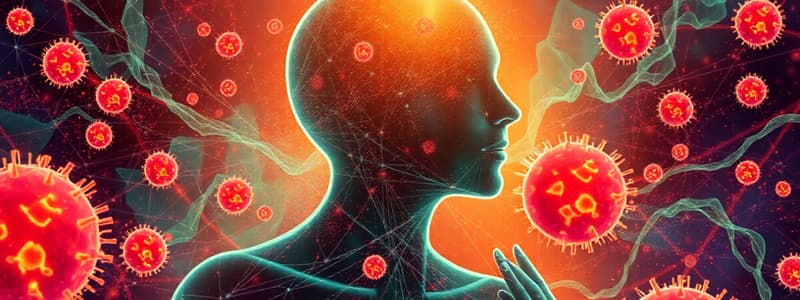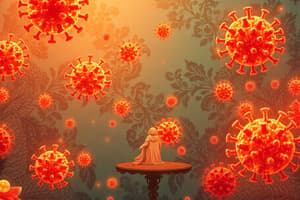Podcast
Questions and Answers
What type of cells primarily process and present allergens during the sensitization phase of Type I hypersensitivity?
What type of cells primarily process and present allergens during the sensitization phase of Type I hypersensitivity?
- Macrophages
- Dendritic cells (DC2) (correct)
- B cells
- T cells
Which cytokine is primarily involved in promoting the class switch to IgE in B cells during Type I hypersensitivity?
Which cytokine is primarily involved in promoting the class switch to IgE in B cells during Type I hypersensitivity?
- TNF-alpha
- IL-5
- IL-2
- IL-4 (correct)
What is the outcome of the sensitization phase in a Type I hypersensitivity reaction?
What is the outcome of the sensitization phase in a Type I hypersensitivity reaction?
- Development of autoimmune disease
- Inflammation at the site of allergen exposure
- Animal is sensitized with no clinical signs (correct)
- Immediate allergic reaction
Which type of T cells are preferentially elicited during the sensitization phase of Type I hypersensitivity?
Which type of T cells are preferentially elicited during the sensitization phase of Type I hypersensitivity?
What role do IgE antibodies play in Type I hypersensitivity after an allergen is encountered?
What role do IgE antibodies play in Type I hypersensitivity after an allergen is encountered?
What triggers the degranulation of mast cells in Hypersensitivity I?
What triggers the degranulation of mast cells in Hypersensitivity I?
What is the primary characteristic of hypersensitivity reactions?
What is the primary characteristic of hypersensitivity reactions?
Which of the following is NOT a vasoactive molecule contained in mast cell granules?
Which of the following is NOT a vasoactive molecule contained in mast cell granules?
In the context of an allergic response, what is the role of chemotactic molecules?
In the context of an allergic response, what is the role of chemotactic molecules?
Which factors can lead to the development of hypersensitivity responses?
Which factors can lead to the development of hypersensitivity responses?
What is meant by sensitization in the context of hypersensitivity?
What is meant by sensitization in the context of hypersensitivity?
What is a potential systemic effect of mast cell degranulation in an allergic response?
What is a potential systemic effect of mast cell degranulation in an allergic response?
During the effector phase of Hypersensitivity I, which type of antibodies are primarily involved?
During the effector phase of Hypersensitivity I, which type of antibodies are primarily involved?
What are allergens defined as in the context of hypersensitivity?
What are allergens defined as in the context of hypersensitivity?
What can be inferred about the six-year-old cat's reaction after vaccination?
What can be inferred about the six-year-old cat's reaction after vaccination?
What initiates the 'immediate hypersensitivity' response?
What initiates the 'immediate hypersensitivity' response?
Which type of cell plays a critical role in the effector phase of Hypersensitivity I?
Which type of cell plays a critical role in the effector phase of Hypersensitivity I?
Why might a hypersensitivity reaction not occur after the first exposure to an antigen?
Why might a hypersensitivity reaction not occur after the first exposure to an antigen?
Which of the following is a characteristic of anaphylaxis?
Which of the following is a characteristic of anaphylaxis?
Which of the following best describes atopy?
Which of the following best describes atopy?
Which phase primarily involves the effector response in type I hypersensitivity?
Which phase primarily involves the effector response in type I hypersensitivity?
What role do amines like histamine play in the body during a hypersensitivity reaction?
What role do amines like histamine play in the body during a hypersensitivity reaction?
What is the consequence of bronchial smooth muscle contraction during a hypersensitivity reaction?
What is the consequence of bronchial smooth muscle contraction during a hypersensitivity reaction?
Which cells are primarily involved in the hypersensitivity response in the skin?
Which cells are primarily involved in the hypersensitivity response in the skin?
What is a result of mast cell degranulation during a hypersensitivity reaction?
What is a result of mast cell degranulation during a hypersensitivity reaction?
Which of the following can trigger Type I hypersensitivity reactions?
Which of the following can trigger Type I hypersensitivity reactions?
What initiates the sensitization phase in Type II hypersensitivity related to drug-induced anemia?
What initiates the sensitization phase in Type II hypersensitivity related to drug-induced anemia?
Which process is primarily responsible for the destruction of red blood cells in Type II hypersensitivity?
Which process is primarily responsible for the destruction of red blood cells in Type II hypersensitivity?
In the context of hemolytic anemia of the newborn, how do maternal antibodies affect fetal red blood cells?
In the context of hemolytic anemia of the newborn, how do maternal antibodies affect fetal red blood cells?
What is a requirement for the mother to develop lethal antibody levels against fetal red blood cells in hemolytic disease?
What is a requirement for the mother to develop lethal antibody levels against fetal red blood cells in hemolytic disease?
What is the role of IgG antibodies in Type II hypersensitivity during the effector phase?
What is the role of IgG antibodies in Type II hypersensitivity during the effector phase?
What is the main role of NK cells during the sensitization phase of viral infection?
What is the main role of NK cells during the sensitization phase of viral infection?
Which process is NOT part of the effector phase in response to infected cells?
Which process is NOT part of the effector phase in response to infected cells?
What is the significance of prior exposure in hypersensitivity reactions?
What is the significance of prior exposure in hypersensitivity reactions?
What type of antigens do the antibodies in hypersensitivity II primarily target?
What type of antigens do the antibodies in hypersensitivity II primarily target?
What is one of the mechanisms that the normal host defense utilizes against viral infections?
What is one of the mechanisms that the normal host defense utilizes against viral infections?
Flashcards
Hypersensitivity
Hypersensitivity
An undesirable reaction from a normal immune response to an antigen, often not harmful, like food or pollen.
Sensitization
Sensitization
Initial exposure to an antigen, leading to an immune response that can cause hypersensitivity later.
Allergen
Allergen
An antigen from an often harmless source, like food, drugs or pollen that can trigger an allergic reaction.
Atopy
Atopy
Signup and view all the flashcards
Type I Hypersensitivity
Type I Hypersensitivity
Signup and view all the flashcards
Type II Hypersensitivity
Type II Hypersensitivity
Signup and view all the flashcards
Gell and Coombs Classification
Gell and Coombs Classification
Signup and view all the flashcards
Hypersensitivity - Non-harmful exposure
Hypersensitivity - Non-harmful exposure
Signup and view all the flashcards
Type I Hypersensitivity Sensitization
Type I Hypersensitivity Sensitization
Signup and view all the flashcards
Th2 Cells
Th2 Cells
Signup and view all the flashcards
IgE
IgE
Signup and view all the flashcards
Mast Cells and Basophils
Mast Cells and Basophils
Signup and view all the flashcards
Mast Cell Degranulation
Mast Cell Degranulation
Signup and view all the flashcards
Hypersensitivity Type I Effector Phase
Hypersensitivity Type I Effector Phase
Signup and view all the flashcards
Bronchial Smooth Muscle Contraction
Bronchial Smooth Muscle Contraction
Signup and view all the flashcards
Histamine
Histamine
Signup and view all the flashcards
Acute Inflammation
Acute Inflammation
Signup and view all the flashcards
Anaphylaxis
Anaphylaxis
Signup and view all the flashcards
Vasoactive Molecules
Vasoactive Molecules
Signup and view all the flashcards
Degranulation
Degranulation
Signup and view all the flashcards
Drug-induced anemia
Drug-induced anemia
Signup and view all the flashcards
Hapten
Hapten
Signup and view all the flashcards
Hemolytic anemia of the newborn
Hemolytic anemia of the newborn
Signup and view all the flashcards
Opsonization
Opsonization
Signup and view all the flashcards
Complement-dependent lysis
Complement-dependent lysis
Signup and view all the flashcards
What is the sensitization phase of type II hypersensitivity?
What is the sensitization phase of type II hypersensitivity?
Signup and view all the flashcards
How do antibodies target cells in type II hypersensitivity?
How do antibodies target cells in type II hypersensitivity?
Signup and view all the flashcards
What are the effector mechanisms of type II hypersensitivity?
What are the effector mechanisms of type II hypersensitivity?
Signup and view all the flashcards
Why is type II hypersensitivity important for viral infections?
Why is type II hypersensitivity important for viral infections?
Signup and view all the flashcards
What are the hallmarks of type II hypersensitivity?
What are the hallmarks of type II hypersensitivity?
Signup and view all the flashcards
Study Notes
Hypersensitivity Overview
- Hypersensitivity is an undesirable reaction produced by a normal immune response, such as allergies and autoimmunity.
- Hypersensitivity typically involves antigens that are not normally associated with harm, such as environmental antigens like food, pollen, fleas, or drugs.
Hypersensitivity Types
- There are four main types of hypersensitivity reactions: Type I, Type II, Type III, and Type IV.
- These types are categorized by the immune components involved and the effector phase or the time course.
Type I Hypersensitivity
- Sensitization Phase: Initial exposure to an allergen doesn't cause immediate signs.
- Antigen is processed and presented, resulting in the production of IgE antibodies.
- IgE antibodies bind to mast cells and basophils, marking them for a subsequent response.
- Effector Phase: Subsequent exposure to the allergen leads to rapid degranulation of mast cells and basophils.
- Release of histamine, leukotrienes, and other mediators.
- Causes inflammation and immediate hypersensitivity reaction.
- Clinical Correlate: Examples include allergic rhinitis, asthma, and systemic anaphylaxis, in which there can be a sudden shock response from the massive release of mediators, such as with reaction to vaccines.
- Location: Can occur in various locations, including the airways, gut, and skin.
Type II Hypersensitivity
- Mechanism: Antibodies (IgG or IgM) bind to antigens on cell surfaces, causing cell damage or dysfunction through complement activation, phagocytosis, or antibody dependent cell-mediated cytotoxicity.
- Examples: This includes blood transfusion reactions, hemolytic disease of the newborn, some autoimmune diseases, and some drug reactions.
- Immune Components: Important components include antibodies and the complement system.
- Drug-Induced Anemia: Exogenous chemical modifications of cell surface proteins, resulting in antibody production that targets these modified cells. This causes cell lysis and subsequent anemia.
Hypersensitivity Summary
- Type I typically involves IgE and mast cells.
- Type II typically involves IgG or IgM targeting and damaging cells or altered proteins.
- Each type involves specific immune mechanisms, and results in a variety of clinical responses.
- Immunotherapies can reduce immune responses associated with hypersensitivity.
Studying That Suits You
Use AI to generate personalized quizzes and flashcards to suit your learning preferences.




